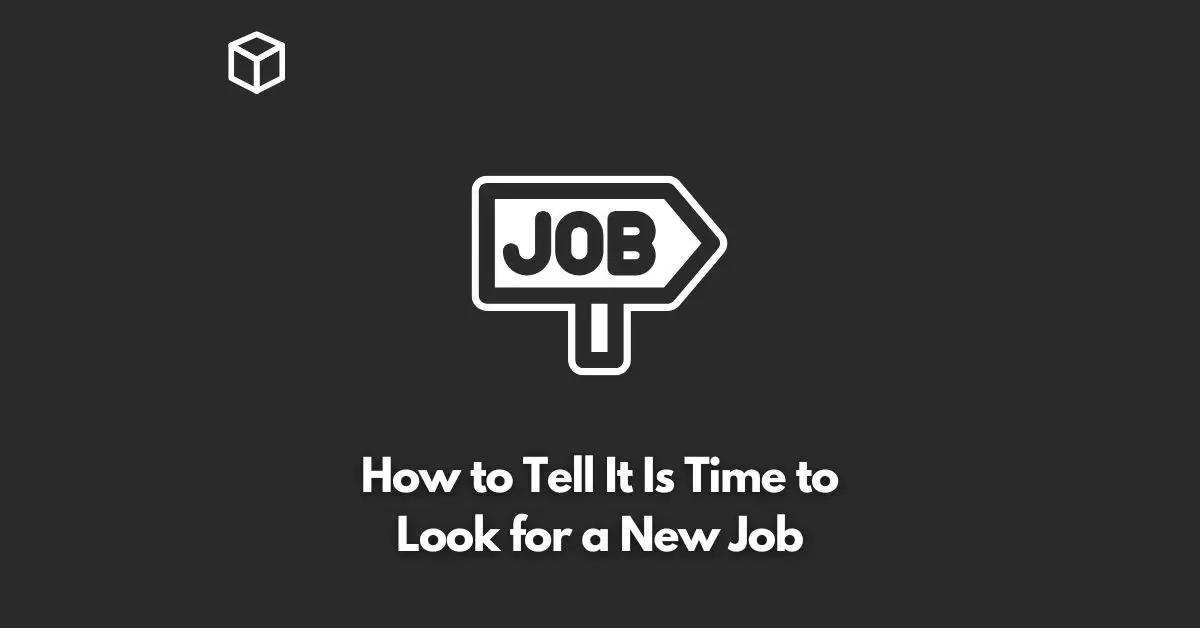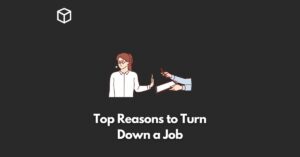In our lifetime, we spend a significant portion of our waking hours at work.
Therefore, it is important that our job not only satisfies our economic needs but also aligns with our personal values, allows for growth and generates a sense of fulfillment.
But, what happens when your job is no longer fulfilling or becomes a source of stress or dissatisfaction?
It’s important to recognize the signs that suggest it may be time to look for a new job.
This blog post will provide valuable insight into determining when to start looking for a new job, helping you navigate your career path successfully.
It’s time to reclaim your happiness and live a more balanced and rewarding work life.
1. Feeling Undervalued: You Deserve Recognition
One of the most common feelings leading to job dissatisfaction is feeling undervalued.
This can manifest itself in many ways, including a lack of recognition for your efforts, a disparity in compensation, or not being included in important conversations or decisions.
When your contributions are consistently overlooked or dismissed, it can cause you to question your worth and ability.
This can quickly lead to demotivation, frustration and decreased productivity.
If you’ve made your feelings known and there’s been no significant improvement, it might be time to consider whether a more appreciative workplace is out there waiting for you.
Every individual deserves to work in an environment where they are respected, acknowledged and rewarded appropriately for their work.
2. The Boredom Rut: Seek Fresh Challenges
While periods of routine tasks are common in any job, extended periods of boredom might be a clear signal that you’re not being challenged enough.
If you find yourself regularly completing your tasks with little thought or creativity, it’s possible your role has become too routine or isn’t leveraging your full skill set.
Constructive conversations with your supervisor about seeking new responsibilities or involvement in different projects can sometimes alleviate this issue.
However, if after making your needs known, you don’t see any changes, it could be time to seek a new job that better aligns with your personal and professional growth ambitions.
3. Stagnation: The Importance of Continuous Learning and Development
Personal and professional growth should be an ongoing journey, regardless of where you are in your career.
If you find yourself unable to recall new skills or knowledge gained over the past year, or if you don’t feel challenged in your role, you might be experiencing stagnation.
Proactive communication with your supervisor about your desire for more diverse responsibilities, additional training, or involvement in new projects can sometimes prompt a change.
However, if your pursuit of growth is met with resistance or indifference, it might be worth exploring opportunities elsewhere, in a workplace that values and invests in your development.
4. Workplace Anxiety: When Stress Overwhelms
Workplace stress is a serious issue, one that can deeply affect not only your job performance but also your mental and physical health.
If you find yourself constantly anxious about work, struggling to sleep, or experiencing physical symptoms such as lack of energy or loss of appetite, it’s essential to address these concerns immediately.
While some level of work-related stress is normal, if it begins to spill into your personal life and negatively affects your overall wellbeing, you need to reassess your situation.
No job is worth sacrificing your health for and it may be time to look for a less stressful work environment.
5. Constant Work Talk: The Negative Impact of Work-related Stress
If you find that your work-related stress is consuming your conversations and mental space even outside work hours, this could be a sign that your job is having an excessively negative impact on your life.
Occasional venting about work is completely normal, but when it becomes a recurrent theme in your discussions, it can indicate that your dissatisfaction is more than temporary.
Seek feedback from your loved ones about your work-related conversations.
If they notice that your discussions about work are predominantly negative, it could be a clear sign to start job-hunting.
Conclusion
In summary, if you’re feeling undervalued, bored, stagnant in your growth, excessively anxious about work, or constantly venting about work, it might be time to seriously consider changing your job.
The decision to leave a job can be challenging, but remember that you deserve a fulfilling career that respects your worth, values your contribution, offers opportunities for growth and maintains a healthy work-life balance.
While it’s crucial to try and address these issues within your current workplace, don’t be afraid to explore new opportunities if necessary.
Reflect on your career goals, desired work environment and the type of job you envision yourself in.
Prioritize your happiness, wellbeing and personal and professional growth.




